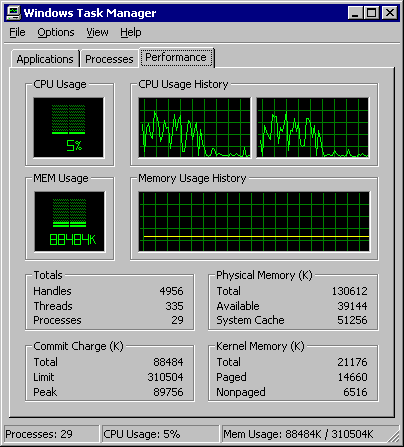The Win32::PerfLib module is a glorious way to extract performance data from Windows boxen. Check out this site for more information. We used perl 5.6.1. Here is a script that shows how to use this module:
use Win32::PerfLib;
$processor = 238;
$proctime = 6;
while (6 ne 9){
if(my $perflib = new Win32::PerfLib('srv-48')){
$proc_ref0 = {};
$proc_ref1 = {};
$perflib->GetObjectList($processor, $proc_ref0);
sleep 3;
$perflib->GetObjectList($processor, $proc_ref1);
sleep 3;
$perflib->Close($proc_ref0);
$perflib->Close($proc_ref1);
$instance_ref0 = $proc_ref0->{Objects}->{$processor}->{Instances};
$instance_ref1 = $proc_ref1->{Objects}->{$processor}->{Instances};
for $p (keys %{$instance_ref0}) {
$counter_ref0 = $instance_ref0->{$p}->{Counters};
$counter_ref1 = $instance_ref1->{$p}->{Counters};
for $i (keys %{$counter_ref0}) {
next if ($instance_ref0->{$p}->{Name} eq "_Total");
if($counter_ref0->{$i}->{CounterNameTitleIndex} == $proctime){
$Numerator0 = $counter_ref0->{$i}->{Counter};
$Denominator0 = $proc_ref0->{PerfTime100nSec};
$Numerator1 = $counter_ref1->{$i}->{Counter};
$Denominator1 = $proc_ref1->{PerfTime100nSec};
$proc_time{$p} = (1- (($Numerator1 - $Numerator0) /
($Denominator1 - $Denominator0 ))) * 100;
if ($highproc < $proc_time{$p}){
$highproc = $proc_time{$p};
}
}
}
}
print $highproc."\n";
$highproc=0;
}
}
|
Let’s run the script:
C:\tm>\Perl\bin\perl cpu.pl 19.5 62.5 41.4507577867798 39.7905638112966 52.6041666666667 45.595836881521 25 41.8848050700341 4.14509679185638 5.12821135568664 ^C C:\tm> |
Here is the task manager view on srv-48:

The if clause around the initial call to Perflib is necessary to keep the program from crashing when the host is unavailable. Set up an else clause to deal with this more completely.


